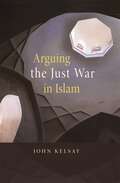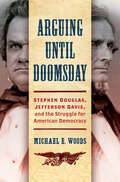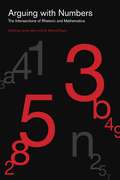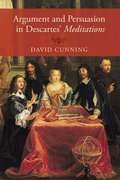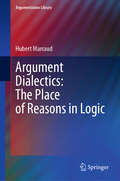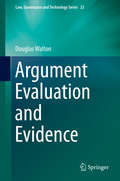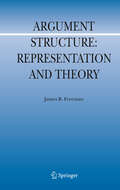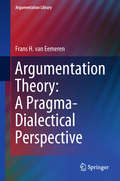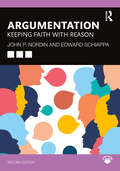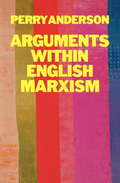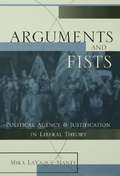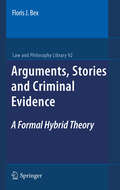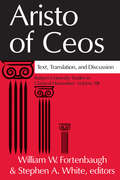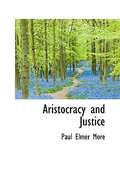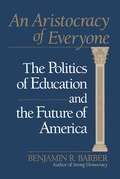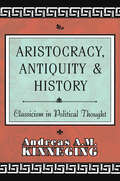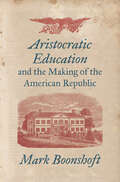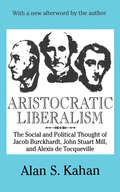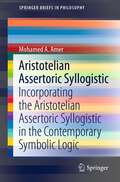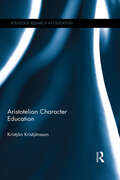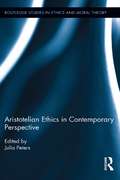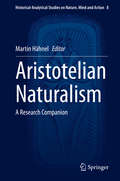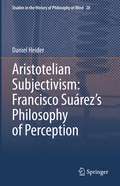- Table View
- List View
Arguing the Just War in Islam
by John KelsayJihad, with its many terrifying associations, is a term widely used today, though its meaning is poorly grasped. Few people understand the circumstances requiring a jihad, or "holy" war, or how Islamic militants justify their violent actions within the framework of the religious tradition of Islam. How Islam, with more than one billion followers, interprets jihad and establishes its precepts has become a critical issue for both the Muslim and the non-Muslim world. John Kelsay's timely and important work focuses on jihad of the sword in Islamic thought, history, and culture. Making use of original sources, Kelsay delves into the tradition of shari'a--Islamic jurisprudence and reasoning--and shows how it defines jihad as the Islamic analogue of the Western "just" war. He traces the arguments of thinkers over the centuries who have debated the legitimacy of war through appeals to shari'a reasoning. He brings us up to the present and demonstrates how contemporary Muslims across the political spectrum continue this quest for a realistic ethics of war within the Islamic tradition. Arguing the Just War in Islam provides a systematic account of how Islam's central texts interpret jihad, guiding us through the historical precedents and Qur'anic sources upon which today's claims to doctrinal truth and legitimate authority are made. In illuminating the broad spectrum of Islam's moral considerations of the just war, Kelsay helps Muslims and non-Muslims alike make sense of the possibilities for future war and peace.
Arguing until Doomsday: Stephen Douglas, Jefferson Davis, and the Struggle for American Democracy (Civil War America)
by Michael E. WoodsAs the sectional crisis gripped the United States, the rancor increasingly spread to the halls of Congress. Preston Brooks's frenzied assault on Charles Sumner was perhaps the most notorious evidence of the dangerous divide between proslavery Democrats and the new antislavery Republican Party. But as disunion loomed, rifts within the majority Democratic Party were every bit as consequential. And nowhere was the fracture more apparent than in the raging debates between Illinois's Stephen Douglas and Mississippi's Jefferson Davis. As leaders of the Democrats' northern and southern factions before the Civil War, their passionate conflict of words and ideas has been overshadowed by their opposition to Abraham Lincoln. But here, weaving together biography and political history, Michael E. Woods restores Davis and Douglas's fatefully entwined lives and careers to the center of the Civil War era. Operating on personal, partisan, and national levels, Woods traces the deep roots of Democrats' internal strife, with fault lines drawn around fundamental questions of property rights and majority rule. Neither belief in white supremacy nor expansionist zeal could reconcile Douglas and Davis's factions as their constituents formed their own lines in the proverbial soil of westward expansion. The first major reinterpretation of the Democratic Party's internal schism in more than a generation, Arguing until Doomsday shows how two leading antebellum politicians ultimately shattered their party and hastened the coming of the Civil War.
Arguing with Numbers: The Intersections of Rhetoric and Mathematics (RSA Series in Transdisciplinary Rhetoric #16)
by James Wynn G. Mitchell ReyesAs discrete fields of inquiry, rhetoric and mathematics have long been considered antithetical to each other. That is, if mathematics explains or describes the phenomena it studies with certainty, persuasion is not needed. This volume calls into question the view that mathematics is free of rhetoric. Through nine studies of the intersections between these two disciplines, Arguing with Numbers shows that mathematics is in fact deeply rhetorical. Using rhetoric as a lens to analyze mathematically based arguments in public policy, political and economic theory, and even literature, the essays in this volume reveal how mathematics influences the values and beliefs with which we assess the world and make decisions and how our worldviews influence the kinds of mathematical instruments we construct and accept. In addition, contributors examine how concepts of rhetoric—such as analogy and visuality—have been employed in mathematical and scientific reasoning, including in the theorems of mathematical physicists and the geometrical diagramming of natural scientists. Challenging academic orthodoxy, these scholars reject a math-equals-truth reduction in favor of a more constructivist theory of mathematics as dynamic, evolving, and powerfully persuasive. By bringing these disparate lines of inquiry into conversation with one another, Arguing with Numbers provides inspiration to students, established scholars, and anyone inside or outside rhetorical studies who might be interested in exploring the intersections between the two disciplines.In addition to the editors, the contributors to this volume are Catherine Chaput, Crystal Broch Colombini, Nathan Crick, Michael Dreher, Jeanne Fahnestock, Andrew C. Jones, Joseph Little, and Edward Schiappa.
Arguing with Numbers: The Intersections of Rhetoric and Mathematics (RSA Series in Transdisciplinary Rhetoric)
by James Wynn G. Mitchell ReyesAs discrete fields of inquiry, rhetoric and mathematics have long been considered antithetical to each other. That is, if mathematics explains or describes the phenomena it studies with certainty, persuasion is not needed. This volume calls into question the view that mathematics is free of rhetoric. Through nine studies of the intersections between these two disciplines, Arguing with Numbers shows that mathematics is in fact deeply rhetorical. Using rhetoric as a lens to analyze mathematically based arguments in public policy, political and economic theory, and even literature, the essays in this volume reveal how mathematics influences the values and beliefs with which we assess the world and make decisions and how our worldviews influence the kinds of mathematical instruments we construct and accept. In addition, contributors examine how concepts of rhetoric—such as analogy and visuality—have been employed in mathematical and scientific reasoning, including in the theorems of mathematical physicists and the geometrical diagramming of natural scientists. Challenging academic orthodoxy, these scholars reject a math-equals-truth reduction in favor of a more constructivist theory of mathematics as dynamic, evolving, and powerfully persuasive. By bringing these disparate lines of inquiry into conversation with one another, Arguing with Numbers provides inspiration to students, established scholars, and anyone inside or outside rhetorical studies who might be interested in exploring the intersections between the two disciplines.In addition to the editors, the contributors to this volume are Catherine Chaput, Crystal Broch Colombini, Nathan Crick, Michael Dreher, Jeanne Fahnestock, Andrew C. Jones, Joseph Little, and Edward Schiappa.
Argument And Persuasion In Descartes' Meditations
by David CunningDescartes' Meditations on First Philosophy has proven to be not only one of the canonical texts of Western philosophy, but also the site of a great deal of interpretive activity in scholarship on the history of early modern philosophy over the last two decades. David Cunning's monograph proposes a new interpretation, which is that from beginning to end the reasoning of the Meditations is the first-person reasoning of a thinker who starts from a confused non-Cartesian paradigm and moves slowly and awkwardly toward a grasp of just a few of the central theses of Descartes' system. The meditator of the Meditations is not a full-blown Cartesian at the start or middle or even the end of inquiry, and accordingly the Meditations is riddled with confusions throughout. Cunning argues that Descartes is trying to capture the kind of reasoning that a non-Cartesian would have to engage in to make the relevant epistemic progress, and that the Meditations rhetorically models that reasoning. He proposes that Descartes is reflecting on what happens in philosophical inquiry: we are unclear about something, we roam about using our existing concepts and intuitions, we abandon or revise some of these, and then eventually we come to see a result as clear that we did not see as clear before. Thus Cunning's fundamental insight is that Descartes is a teacher, and the reader a student. With that reading in mind, a significant number of the interpretive problems that arise in the Descartes literature dissolve when we make a distinction between the Cartesian and non-Cartesian elements of the Meditations, and a better understanding of surrounding texts is achieved as well. This important volume will be of great interest to scholars of early modern philosophy.
Argument Dialectics: The Place of Reasons in Logic (Argumentation Library #45)
by Hubert MarraudThis book is a systematic exposition of Argument Dialectics (AD). Despite its name, argument dialectics is a logical approach to argumentation theory. AD stands out among theories of argument because of three unusual features: it is reasons-based, holistic and particularistic. This implies that AD conceives of logic as a theory of the dialectical construction of reasons, not as a theory of inferences. Consequently, contrary to other logical approaches, AD focuses on the study of inter-argumentative relations, especially those of opposition and weighing. The book makes an extensive use of the theory of reasons, a branch of metaethics that has been a very valuable quarry of intuitions and concepts for the elaboration of a reason-based theory of argument. The oppositions generalism-particularism and atomism-holism, proposed by Jonathan Dancy, which play a central role in the book and in the development of AD, have been adapted from the theory of reasons, and the same can be said of the distinction between different statuses of reasons that AD associates with different kinds of counterarguments. Conceiving of the theory of argument in terms of reasons has the effect of situating the paradigm of argumentation in practical argumentation/reasoning &“about what to do&” rather than in theoretical argumentation &“about what to believe&”, as inference-based theories do. Hence, this book is of interest to argumentation theorists, communication theorists, epistemologists, linguists, moral philosophers, and philosophers of law.
Argument Evaluation and Evidence (Law, Governance and Technology Series #23)
by Douglas WaltonThis monograph poses a series of key problems of evidential reasoning and argumentation. It then offers solutions achieved by applying recently developed computational models of argumentation made available in artificial intelligence. Each problem is posed in such a way that the solution is easily understood. The book progresses from confronting these problems and offering solutions to them, building a useful general method for evaluating arguments along the way. It provides a hands-on survey explaining to the reader how to use current argumentation methods and concepts that are increasingly being implemented in more precise ways for the application of software tools in computational argumentation systems. It shows how the use of these tools and methods requires a new approach to the concepts of knowledge and explanation suitable for diverse settings, such as issues of public safety and health, debate, legal argumentation, forensic evidence, science education, and the use of expert opinion evidence in personal and public deliberations.
Argument Structure: Representation and Theory (Argumentation Library #18)
by James B. FreemanThis monograph first presents a method of diagramming argument macrostructure, synthesizing the standard circle and arrow approach with the Toulmin model. A theoretical justification of this method through a dialectical understanding of argument, a critical examination of Toulmin on warrants, a thorough discussion of the linked-convergent distinction, and an account of the proper reconstruction of enthymemes follows.
Argumentation Theory: A Pragma-Dialectical Perspective (Argumentation Library #33)
by Frans H. van EemerenThe book offers a compact but comprehensive introductory overview of the crucial components of argumentation theory. In presenting this overview, argumentation is consistently approached from a pragma-dialectical perspective by viewing it pragmatically as a goal-directed communicative activity and dialectically as part of a regulated critical exchange aimed at resolving a difference of opinion. As a result, the book also systematically explains how the constitutive parts of the pragma-dialectical theory of argumentation, which are discussed in a number of separate publications, hang together.The following crucial topics are discussed: (1) argumentation theory as a discipline; (2) the meta-theoretical principles of pragma-dialectics; (3) the model of a critical discussion aimed at resolving a difference of opinion; (4) fallacies as violations of a code of conduct for reasonable argumentative discourse; (5) descriptive research of argumentative reality; (6) analysis as theoretically-motivated reconstruction; (7) strategic manoeuvring aimed at combining achieving effectiveness with maintaining reasonableness; (8) the conventionalization of argumentative practices; (9) prototypical argumentative patterns; (10) pragma-dialectics amidst other approaches.Argumentation Theory: A Pragma-Dialectical Perspective is clearly written and makes argumentation theory understandable to all scholars and advanced students interested in argumentation research.
Argumentation: Keeping Faith with Reason
by Edward Schiappa John P. NordinThis extensively updated second edition provides a comprehensive introduction to argumentation skills for undergraduates.Clearly written, with minimal technical jargon, the book features many contemporary real-world examples. Through a unique conceptual framework, students will learn how to assemble a coherent logical argument, assess sources, and organize and present written and verbal arguments. The authors use the Toulmin model throughout to present issues and clarify concepts and have expanded the model to show how it can be used to examine real-world arguments. This new edition provides a deeper focus on value claims and credibility. It also shows students how to assess fake news, misinformation, and post-truth and incorporates more social scientific theories of persuasion such as the Elaboration Likelihood Model.Argumentation: Keeping Faith with Reason is an ideal textbook for undergraduate courses in argumentation, persuasion, critical thinking, and informal logic.An Instructor’s Manual including advice on how to teach each section, sample quizzes, and additional examples is available at https://routledge.com/9781032541228.
Arguments Within English Marxism
by Perry AndersonThe characteristic form taken by English Marxism since the war has been the study of history. No writer exemplifies its achievements better than Edward Thompson, whose Making of the English Working Class is probably the most influential single work of historical scholarship by a socialist today. An editor of The New Reasoner in 1957–59, a founder of the New Left in 1960, now an eloquent champion of civil rights, Thompson has most recently aroused widespread interest with the appearance of his Poverty of Theory, which combines philosophical and political polemic with Louis Althusser, and powerful advocacy of the historian's craft. Arguments Within English Marxism is an assessment of its central theses that relates them to Thompson's major historical writings themselves. Thus the role of human agency—the part of the conscious choice and active will—in history is discussed through consideration of its treatment in The Making of the English Working Class. The problems of base and superstructure in historical materialism, and of affiliation to values in the past, are reviewed in the light of Whigs and Hunters. The claims of utopian imagination are illustrated from the findings of William Morris. Questions of socialist strategy are broached in part through the articles now collected in Writing by Candlelight. Exploring at once differences and convergences between New Left Review and one of its founders, the essay concludes by suggesting the virtues of diversity within a common socialist culture.
Arguments and Fists: Political Agency and Justification in Liberal Theory
by Mika LaVaque MantyFirst published in 2002. Routledge is an imprint of Taylor & Francis, an informa company.
Arguments, Stories and Criminal Evidence: A Formal Hybrid Theory (Law and Philosophy Library #92)
by Floris J. BexIn this book a theory of reasoning with evidence in the context of criminal cases is developed. The main subject of this study is not the law of evidence but rather the rational process of proof, which involves constructing, testing and justifying scenarios about what happened using evidence and commonsense knowledge. A central theme in the book is the analysis of ones reasoning, so that complex patterns are made more explicit and clear. This analysis uses stories about what happened and arguments to anchor these stories in evidence. Thus the argumentative and the narrative approaches from the research in legal philosophy and legal psychology are combined. Because the book describes its subjects in both an informal and a formal style, it is relevant for scholars in legal philosophy, AI, logic and argumentation theory. The book can also appeal to practitioners in the investigative and legal professions, who are interested in the ways in which they can and should reason with evidence.
Aristo of Ceos: Text, Translation, and Discussion (Rutgers University Studies in Classical Humanities)
by William W. Fortenbaugh Stephen A. WhiteVolume 13 in the RUSCH series continues work already begun on the School of Aristotle. Volume 9 featured Demetrius of Phalerum, Volume 10, Dicaearchus of Messana, Volume 11, Eudemus of Rhodes, and Volume 12, both Lyco of Troas and Hieronymus of Rhodes. Now Volume 13 turns our attention to Aristo of Iulis on Ceos, who was active in the last quarter of the third century BCE. Almost certainly he was Lyco's successor as head of the Peripatetic School. In antiquity, Aristo was confused with the like-named Stoic philosopher from Chios, so that several works were claimed for both philosophers. Among these disputed works, those with Peripatetic antecedents, like Exhortations and Erotic Dissertations, are plausibly assigned to Aristo of Ceos. Other works attributed to the Peripatetic are Lyco (presumably a biography of Aristo's predecessor), On Old Age, and Relieving Arrogance.Whether part of the last-named work or a separate treatise, Aristo's descriptions of persons exhibiting inconsiderateness, self-will, and other unattractive traits relate closely to the Characters of Theophrastus. In addition, Aristo wrote biographies of Heraclitus, Socrates, and Epicurus. We may be sure that he did the same for the leaders of the Peripatos, whose wills he seems to have preserved within the biographies.The volume gives pride of place to Peter Stork's new edition of the fragments of Aristo of Ceos. The edition includes a translation on facing pages. There are also notes on the Greek and Latin texts (an apparatus criticus) and substantive notes that accompany the translation. This edition will replace that of Fritz Wehrli, which was made over half a century ago and published without translation.
Aristocracy and Justice
by Paul Elmer MoreThis is a pre-1923 historical reproduction that was curated for quality. Quality assurance was conducted on each of these books in an attempt to remove books with imperfections introduced by the digitization process.
Aristocracy of Everyone
by Benjamin BarberIn this brilliant, controversial, and profoundly original book, Benjamin R. Barber fundamentally alters the terms of the current debate over the value of opportunity in American education, politics, and culture.Barber argues that the fashionable rallying cries of cultural literacy and political correctness completely miss the point of what is wrong with our society. While we fret about "the closing of the American mind" we utterly ignore the closing of American schools. While we worry about Japanese technology, we fail to tap the more fundamental ideological resources on which our country was founded. As Barber argues, the future of America lies not in competition but in education. Education in America can and must embrace both democracy and excellence.Barber demonstrates persuasively that our national story has always comprised an intermingling of diverse, contradictory, often subversive voices. Multiculturalism has, from the very start, defined America. From his gripping portrait of America poised on the brink of unprecedented change, Barber offers a daringly original program for effecting change: for teaching democracy depends not only on the preeminence of education but on a resurgence of true community service.A ringing challenge to the complacency, cynicism, and muddled thinking of our time that will change the way you feel about being an American citizen.
Aristocracy, Antiquity and History: Classicism in Political Thought
by Andreas KinnegingThis brilliant critique of the literature on modernity challenges conventional approaches in two fundamental ways: First, the lineage of the modern turns out to be less ancient and glorious than is usually suggested. Modernity is an upstart rather than a scion of an old and celebrated line. The roots of modernity are held to be less secure than previously thought. This leads the author to suggest that the demise of the old is a matter of rhetoric rather than reality. The old was driven underground rather than extinguished. The inherited traditions are deeply embedded in our souls. We turn to modernity as a half-baked worldview to overcome our estrangement from the past.Kinneging examines this sweeping view in the concrete circumstances of the imagined fall of the aristocracy and rise of the enterprising bourgeoisie. But aristocracy, this study reveals a strong and thriving noblesse, not only in places like Russia and Prussia, but also in advanced capitalist states like France and England. Aristocracy, Antiquity, and History shows conclusively that the actual demise of this exploration into the sources of Western thought takes seriously the strength of an aristocratic vision that lives on in a variety of conservative and liberal doctrines.In Aristocracy, Antiquity and History the readers is reacquainted with the democratic potential as in the work of Montesquieu, and the way in which classicism, romanticism, and modernism, far from a sequential set of events, are entwined in the ethic of honor and in the moral order of modern life. In trying to understand modernity, advanced societies cannot help but draw attention to the old by way of contrast. The presence of antiquity, however suppressed or shrugged off, does not disappear, but stays with us in the very act of rebellion against the ancients. This fine work in the history of ideas will serve to redefine and redirect researches in social and political theory for years to come.
Aristocratic Education and the Making of the American Republic
by Mark BoonshoftFollowing the American Revolution, it was a cliche that the new republic's future depended on widespread, informed citizenship. However, instead of immediately creating the common schools--accessible, elementary education--that seemed necessary to create such a citizenry, the Federalists in power founded one of the most ubiquitous but forgotten institutions of early American life: academies, privately run but state-chartered secondary schools that offered European-style education primarily for elites. By 1800, academies had become the most widely incorporated institutions besides churches and transportation projects in nearly every state.In this book, Mark Boonshoft shows how many Americans saw the academy as a caricature of aristocratic European education and how their political reaction against the academy led to a first era of school reform in the United States, helping transform education from a tool of elite privilege into a key component of self-government. And yet the very anti-aristocratic critique that propelled democratic education was conspicuously silent on the persistence of racial and gender inequality in public schooling. By tracing the history of academies in the revolutionary era, Boonshoft offers a new understanding of political power and the origins of public education and segregation in the United States.
Aristocratic Liberalism: The Social and Political Thought of Jacob Burckhardt, John Stuart Mill, and Alexis De Tocqueville
by Alan Kahan"Liberalism" is widely used to describe a variety of social and political ideas, but has been an especially difficult concept for historians and political scientists to define. Burckhardt, Mill, and Tocqueville define one type of liberal thought. They share an aristocratic liberalism marked by distaste for the masses and the middle class, opposition to the commercial spirit, fear and contempt of mediocrity, and suspicion of the centralized state. Their fears are combined with an elevated ideal of human personality, an ideal which affirms modernity. All see their ideals threatened in the immediate future, and all hope to save European civilization from barbarism and militarism through some form of education, although all grow more pessimistic towards the end of their lives.Aristocratic Liberalism ignores the national boundaries that so often confine the history of political thought, and uses the perspective thus gained to establish a pan-European type of political thought. Going beyond Burckhardt, Mill, and Tocqueville, Aristocratic Liberalism argues for new ways of looking at nineteenth-century liberalism. It corrects many prevalent misconceptions about liberalism, and suggests new paths for arriving at a better understanding of the leading form of nineteenth-century political thought. The new Afterword by the author presents a novel description of liberal political language as the "discourse of capacity," and suggests that this kind of language is the common denominator of all forms of European liberalism in the nineteenth century. Aristocratic Liberalism will be valuable to students of history, political science, sociology, and political philosophy.
Aristotelian Assertoric Syllogistic: Incorporating the Aristotelian Assertoric Syllogistic in the Contemporary Symbolic Logic (SpringerBriefs in Philosophy)
by Mohamed A. AmerThis book is a treatise on Aristotelian assertoric syllogistic, which is currently of growing interest. Some centuries ago, it attracted the attention of the founders of modern logic, who approached it in several (semantical and syntactical) ways. Further approaches were introduced later on. In this book these approaches (with few exceptions) are discussed, developed and interrelated. Among other things, different facets of soundness, completeness, decidability, and independence for Aristotelian assertoric syllogistic are investigated. Specifically arithmetization (Leibniz), algebraization (Leibniz and Boole), and Venn models (Euler and Venn) are examined. The book is aimed at scholars in the fields of logic and history of logic.
Aristotelian Character Education (Routledge Research in Education)
by Kristján KristjánssonThis book provides a reconstruction of Aristotelian character education, shedding new light on what moral character really is, and how it can be highlighted, measured, nurtured and taught in current schooling. Arguing that many recent approaches to character education understand character in exclusively amoral, instrumentalist terms, Kristjánsson proposes a coherent, plausible and up-to-date concept, retaining the overall structure of Aristotelian character education.After discussing and debunking popular myths about Aristotelian character education, subsequent chapters focus on the practical ramifications and methodologies of character education. These include measuring virtue and morality, asking whether Aristotelian character education can salvage the effects of bad upbringing, and considering implications for teacher training and classroom practice. The book rejuvenates time-honoured principles of the development of virtues in young people, at a time when ‘character’ features prominently in educational agendas and parental concerns over school education systems.Offering an interdisciplinary perspective which draws from the disciplines of education, psychology, philosophy and sociology, this book will appeal to researchers, academics and students wanting a greater insight into character education.
Aristotelian Ethics in Contemporary Perspective (Routledge Studies in Ethics and Moral Theory)
by Julia PetersBy bringing together influential critics of neo-Aristotelian virtue ethics and some of the strongest defenders of an Aristotelian approach, this collection provides a fresh assessment of the strengths and weaknesses of Aristotelian virtue ethics and its contemporary interpretations. Contributors critically discuss and re-assess the neo-Aristotelian paradigm which has been predominant in the philosophical discourse on virtue for the past 30 years.
Aristotelian Naturalism: A Research Companion (Historical-Analytical Studies on Nature, Mind and Action #8)
by Martin HähnelThis book features many of the leading voices championing the revival of Neo-Aristotelian Ethical Naturalism (AN) in contemporary philosophy. It addresses the whole range of issues facing this research program at present. Coverage in the collection identifies differentiations, details standpoints, and points out new perspectives. This volume answers a need: AN is quite new to contemporary philosophy, despite its deep roots in the history of philosophy. As yet, there are many unanswered questions regarding its relation to contemporary views in metaethics. It is certainly not equivalent to dominant naturalistic approaches to metaethics in Anglophone philosophy. Indeed, it is not obviously incompatible with some approaches identified as nonnaturalistic. Further, there are controversies regarding the views of the first wave of virtue revivalists. The work of G.E.M. Anscombe and Philippa Foot is frequently misunderstood, despite the fact that they are important figures in the contemporary revival. This volume details a robust approach to ethics by situating it within the context of human life. It will help readers to better understand how AN raises deep questions about the relation of action and its evaluation to human nature. Neo-Aristotelians argue that something like the traditional cardinal virtues, practical wisdom, temperance, justice and courage, are qualities that perfect human reason and desire.
Aristotelian Subjectivism: Francisco Suárez’s Philosophy of Perception (Studies in the History of Philosophy of Mind #28)
by Daniel HeiderThis monograph presents new material on Francisco Suárez’s comprehensive theory of sense perception. The core theme is perceptual intentionality in Suárez’s theory of the senses, external and internal, as presented in his Commentaria una cum quaestionibus in libros Aristotelis De anima published in 1621. The author targets the question of the multistage genesis of perceptual acts by considering the ontological “items” involved in the procession of sensory information. However, the structural issue is not left aside, and the nature of the relationship due to which our perceptions are mental representations of this or that object is also considered. The heuristic historiographical background includes not only the theories of classical authors, such as Aristotle and Aquinas, but also those of late medieval authors of the fourteenth century. These are headed by John Duns Scotus, John of Jandun, Peter Auriol and Peter John Olivi. Readers will discover the differences between Suárez’s and Aquinas’s views, as well as other sources that may have served as positive inspiration for the Jesuit’s theory. By considering the late medieval philosophy of the fourteenth century, this book helps, to a certain extent, to fill a gap in the historiography of philosophy regarding the link between late medieval and early modern scholasticism. In the first part of the book, the metaphysics of the soul and powers is considered. Chapters on the external senses follow, covering topics such as the sensible species, the causes of sensation, self-awareness, and the ordering of the external senses. A further chapter is devoted to the internal senses and the author argues that by reducing the number and functional scope of the interior senses Suárez deepens the gap between the external senses and the intellect, but he reduces it through emphasizing the unifying efficacy of the soul.This book brings a synthetic and unifying perspective to contemporary research and will particularly appeal to graduate students and researchers in theology and philosophy, especially philosophy of mind.
Aristotelianism in the First Century Bce
by Andrea FalconThis book is a full study of the remaining evidence for Xenarchus of Seleucia, one of the earliest interpreters of Aristotle. Andrea Falcon places the evidence in its context, the revival of interest in Aristotle's philosophy that took place in the first century BCE. Xenarchus is often presented as a rebel, challenging Aristotle and the Aristotelian tradition. Falcon argues that there is more to Xenarchus and his philosophical activity than an opposition to Aristotle; he was a creative philosopher, and his views are best understood as an attempt to revise and update Aristotle's philosophy. By looking at how Xenarchus negotiated different aspects of Aristotle's philosophy, this book highlights elements of rupture as well as strands of continuity within the Aristotelian tradition.
